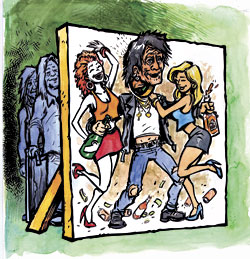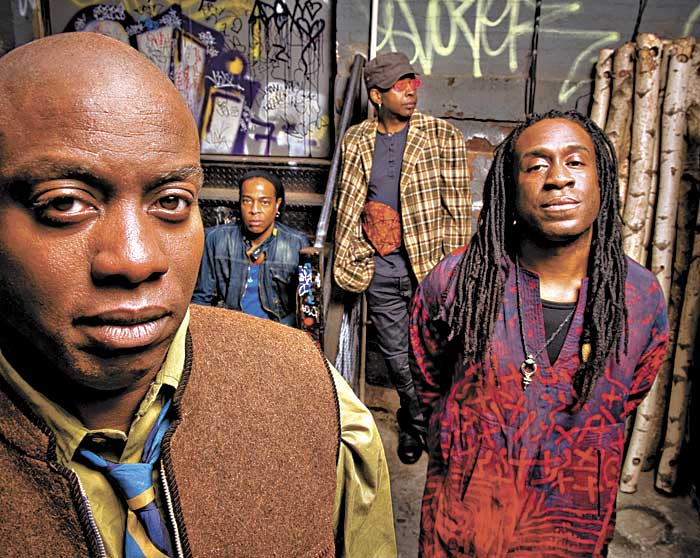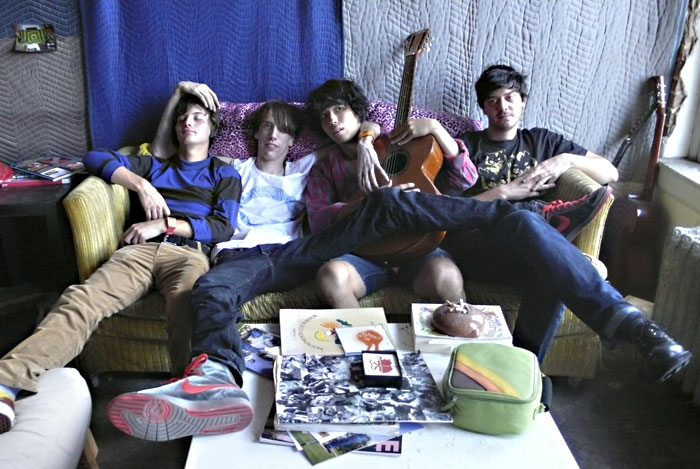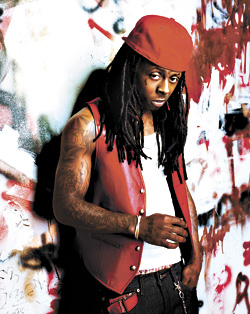If you go to see Mötley Crüe on their current tour, you’re not so much seeing Mötley Crüe as a Broadway-musical version of Mötley Crüe. The band members won’t be snorting lines and molesting groupies backstage, but they’ll be singing abouthow they used to snort lines and molest groupies. It’s a bizarre celebration of debauchery without any actual debauchery.
Perhaps it’s not surprising. Their legacy will always be their backstage antics, even more so than classic pop/metal albums like Shout at the Devil and Dr. Feelgood. At the height of their ’80s infamy there wasn’t anything the guys wouldn’t drink or stick their dicks into, and the whole thing was gloriously chronicled in their 2001 best-selling tell-all, The Dirt. Sample sentence: “Vince [Neil] had taped pictures from porno magazines all over the wall, and girls were streaming in and out of the studio, getting fucked with microphones in the control room, bottles in the kitchen, and broom handles in the closet because we were running out of ideas of what to do with them.”
With lead guitarist Mick Mars an astonishing 57 years old, it’s understandable that they’ve dialed things down a notch. Age, bouts with rehab, and family responsibilities have conspired to limit the needles and group sex nowadays. But the sad thing is that even as the guys mature, they’re milking their former hedonism like never before in an attempt to stay relevant (and flush with cash).
Their new album, Saints of Los Angeles—their first featuring all the original members since 1997’s Generation Swine—is essentially a musical remake of…The Dirt. It’s a song-by-song chronicling of their debased days, from coming up on the Sunset strip (“Down at the Whisky”) to their various failed centerfold romances (“Chicks = Trouble”). This is surely a hair-metal first, an album about a band’s own autobiography. And while Saints of Los Angeles contains its moments of fun (particularly “Face Down in the Dirt”) and debuted at #4, it will only sell a fraction of Girls Girls Girls‘ numbers.
But that doesn’t matter, because Saints of Los Angeles is the launching pad for the group’s current tour, called “Crüe Fest” and featuring Buckcherry, Papa Roach, Trapt, and Sixx’s spinoff band Sixx:A.M. Mötley Crüe has dreams of turning the event into a long-running cash cow along the lines of Ozzfest. “[I]t’s about showmanship and it’s about lifestyle,” Nikki Sixx said of the tour on a recent conference call, in a telling display of industry buzz-speak. And while he doesn’t explicitly detail the “lifestyle” he refers to, it’s clearly the “too drunk to come in a groupie’s hair” one. The one they don’t practice anymore.
Maybe it shouldn’t be surprising that the band has gone corporate. After all, they have been branching into other facets of the entertainment industry for years now, from Tommy Lee Goes to College to Sixx’s addiction chronicle The Heroin Diaries to, well, various sex tapes.
And while it certainly wasn’t pretty to watch Vince Neil get married by MC Hammer on The Surreal Life, at least the group hasn’t been confined to the club circuit like many of their peers, playing on cock-rock triple-bills before diminishing audiences.
So the Crüe has stayed in the limelight, but at what cost? By repackaging their past to sell to a new generation, they have robbed themselves of an opportunity to evolve as artists. Don’t laugh—they say in The Dirt that their art is important to them. Surely reflecting honestly on their current lives would lead to more fulfilling works.
Instead the group panders to their fans, who clearly want the old Crüe. “We’re aware of what people feel is successful and what people feel has not been as successful,” Sixx says. “I mean, we’re aware. We’re smart. We read, you know, the Internet.”
It’s almost like the Beatles staging their own version of Beatlemania, the Broadway musical which paid them homage through a revolving door of impersonators. By focusing on their Theater of Pain days, Mötley Crüe is practically trying to trick audiences into thinking they’re not seeing the current, bloated, anachronistic version of the band, but the younger, more relevant one. Unabashed capitalism never feels very rock-‘n’-roll, and Broadway-style musicals don’t seem like Mötley Crüe ‘s style.








